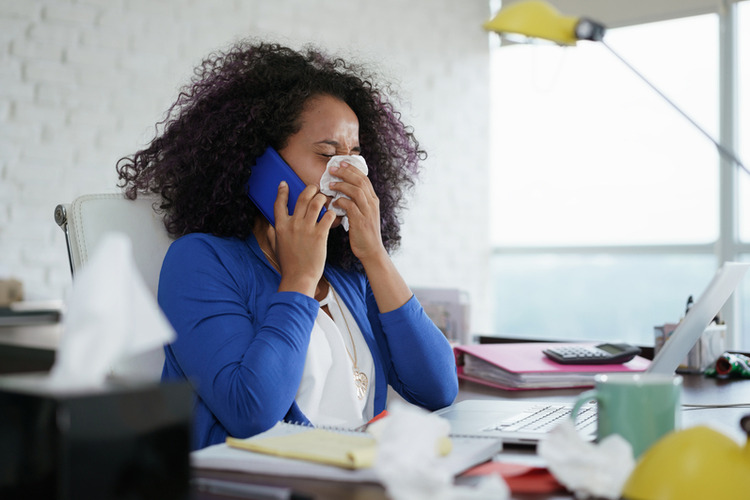Have you ever wondered why some people seem to be prone to catch every virus, bug or illness that is going around? Maybe you or someone you know experiences this and no matter what you do or how you try to protect yourself you still get sick.
Many people find themselves susceptible to being chronically sick which can lead to excessive time off work, missing out on special events, exposing your loved ones and wearing down your immune system even more with each bug that you catch.
An occasional cold or mild case of the flu can actually help build your immune system. Think of it as kind of a practice run that tunes up the immune system’s ability to perform when needed. However, getting sick more than once or twice a year puts a strain on your immune system, making it harder to recover and bounce back when your body needs those immune fighter cells to perform.
Our immune system constantly interacts with our internal environment to protect us from dangers in the outside environment. Think of your immune cells like soldiers that are on patrol traveling through your body, ever watchful for viruses, bacteria, and aged or damaged cells that need to be eliminated. These microscopic soldiers determine whether elements from the outside world that have entered the blood stream are friend or foe. When they detect a friendly cell, imagine those soldiers saluting those healthy cells and sending them on their way to their next destination within the body. However, if they detect an enemy cell, one that will be dangerous and that could wreak havoc on our body, they immediately go to work to destroy the enemy and protect the host…YOU!
Some people may have an underactive or dysregulated immune systems due to genetics, age, poor diet, lifestyle, medications, and even environmental factors. But the good news is for many of these people that can change. In most cases, we can build a strong force of immune cells.
3 Lines of Defense
Barriers to Entry – The immune system consists of major systems to protect our bodies from external forces that could hinder our health. The first line of defense are the barriers to entry. The barriers to entry are the points at which our bodies protect viruses and bacteria from entering our bodies in the first place. Those barriers include our skin, mucous membrane in our nose, cilia which are the tiny hairs lining the membranes in our nose, the epiglottis which is the flap at the base of the tongue that prevents food and water from entering our lungs when we swallow, and our tonsils which prevent germs from entering our bodies.
Innate Immunity – The innate immune system is a group of white blood cells and other biochemical substances that provide a non-specific quick response to isolate and destroy any invaders that have found their way into the body by getting through the barriers to entry.
Acquired Immunity – The acquired immune system is a group of white blood cells that form to target a specific type of invader that has made its way through the first two types of defense, the barriers to entry and the innate immune system.
As you can see, our bodies have a very strong and systematic approach to preventing harmful bugs from getting in as well as fighting to eliminate those bugs if they do get past the protective layers. And yet, even with this complex system in place, things can happen that weaken our immune defense system and make us more susceptible to catching something such as a common cold, a more serious virus or a bacterial infection.
So how do we ensure that our body has everything needed to
keep our immune system strong?
We help our body develop and keep our immune system strong in two primary ways that help move toxins and foreign invaders out of our system and provide the necessary nutrients need to support detoxification and immune cell growth.
Pumping our Lymphatic system – Exercise and moving toxins
Once foreign invaders have found their way into our bodies, our lymphatic system works as a secondary circulation system to capture and remove foreign cells and proteins and then prepares them to be detoxified and eliminated through a number of ways. The lymphatic system is made up of lymph nodes located in the neck, groin, arm pits, inside of the elbows and the back of our knees. Tonsils and adenoids contain lymphatic tissue and will often swell or become inflamed indicating that infection is present.
The lymph system is different than our other circulatory systems, in that it does not have the ability to pump fluids and toxins through it. This makes it possible for the lymph system to become stagnate in which toxins can remain in the lymph for longer periods of time leaving the body at higher risk of infection. On the other hand, when the lymphatic system is pumped, the toxins and foreign invaders are safely moved out of the body and eliminated through urine, feces, sweat, and even the moisture in our breath.
The very best way to pump your lymphatic system is by getting regular exercise. Vigorous exercise in which you move your body in a full range of motion is ideal. Lifting your arms of above your head to move the lymph in your armpits, running biking or walking moves your legs in a way that pumps your groin and knees, and breaking a sweat so that those toxins that are now on the move can be excreted is one of the best ways to remove toxins and foreign invaders and keep your body running smoothly.
Detoxing the Liver – Dietary Detox
The liver and gall bladder are the stars of the show when it comes to removing toxins from our blood stream. The liver is responsible for removing all toxins from the body including environmental chemicals, pesticides and other food toxins, prescription drugs & medications, over the counter medications, recreational drugs, nicotine, caffeine, alcohol and excess sugar. Yes, even excess sugar needs to be processed by the liver and an abundance of sugar to process bogs the liver down making it sluggish and less responsive and it can create non-alcoholic fatty liver disease all of which make it more challenging for the liver to do its job and more likely for a buildup of toxins to occur that can jeopardize our immune system and our health.
The gall bladder works together with the liver by producing bile salts to help breakdown fatty acids. Fats being digested or broken down by bile salts, which are produced by the gall bladder, are wrapped around toxins to safely move the toxins through our digestive tract without harm so that they can be excreted through urine and feces.
Keeping the liver and gall bladder functioning properly and improving our immune health is essential and is primarily done by eliminating exposure to drugs, alcohol, sugar and other toxins and by including foods that are rich in certain nutrients in your diet to build a strong immune system, support a healthy liver, and support the gall bladder in producing healthy levels of bile salts to break down fats and carry away toxins.
What are the best sources of food to build a strong immune system?
Following a REAL food diet that has a healthy balance of foods grown as close to their original source as possible including a variety of colorful fruits and vegetables, organic whole milk dairy if tolerated, plenty of healthy fats and specifically omega 3 fats, and protein from meat, eggs, poultry, fish, nuts and seeds. Here are few key foods and nutrients to focus on:
Protein – Sufficient protein from meat, fish, poultry eggs and cheese is needed to form immune tissues and grow antibodies.
Vitamin B12– Primarily found in meat, fish, milk, cheese & eggs stimulates the immune system.
Omega 3 fats – Healthy fats from cold water fish such as salmon and cod liver oil, pumpkin seeds, walnuts and flax seeds reduce inflammation of the liver and other organs helping them do their job more effectively.
Iodine – Found in fish, shell fish, iodized salt, kelp, eggs, and beef liver supports a healthy thyroid and also the killing of microbial invaders.
Zinc – Helps in the production and function of immune cells and can be found in foods like oysters, crab, red meat including beef and lamb, pumpkin seeds and almonds.
Vegetables and fruits – Eat from a variety of colored vegetables and fruits for their plant fiber, vitamins and minerals that act as antioxidants and help the body to clear toxins and foreign invaders from the body.
Water – Choose water as your beverage of choice and drink 10 to 12 cups per day for most adults to help flush toxins from your system.
Avoid Toxic Foods, Drugs & Beverages
When possible, avoid any unnecessary medications, drugs, alcohol, excessive caffeine, nicotine products of all kinds, and chemical cleaning agents.
Avoid processed and packaged foods especially foods containing white flour and sugar.
Avoid highly processed and toxic seed oils such as Canola oil, vegetable oil, corn oil, margarine and all trans fats.
When medications are necessary, work to support you detoxification system through activity and a healthy well-balanced diet.
Take care of yourself from the inside out and stay well friend.




